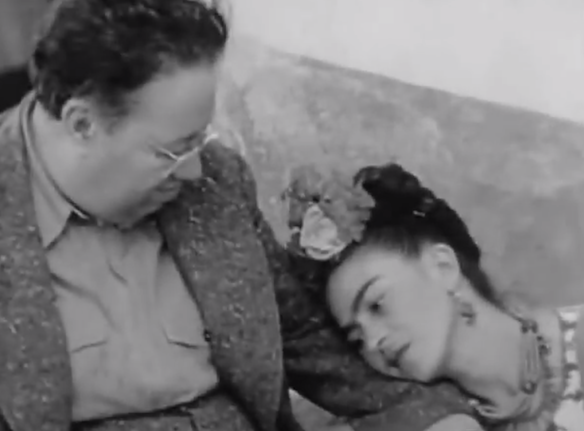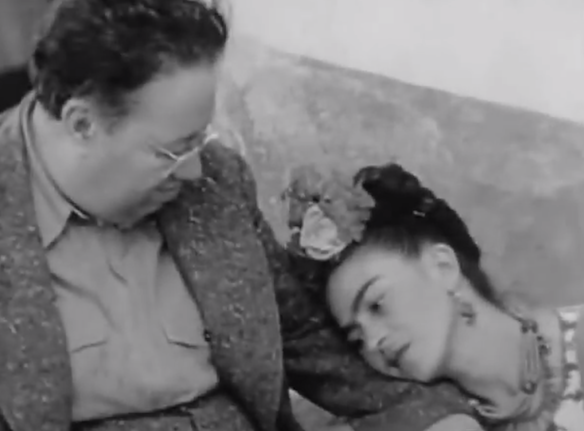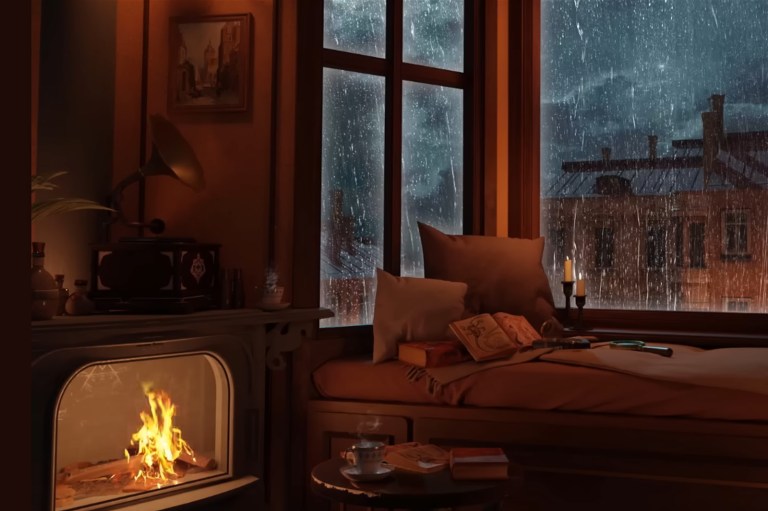
The 16 Most Beautifully Touching Love Letters From Famous Writers And Artists

1. Allen Ginsburg to poet Peter Orlovsky:
Dear Petey:
O Heart O Love everything is suddenly turned to gold! Don’t be afraid don’t worry the most astounding beautiful thing has happened here! I don’t know where to begin but the most important. When Bill [ed: William S. Burroughs] came I, we, thought it was the same old Bill mad, but something had happened to Bill in the meantime since we last saw him…but last night finally Bill and I sat down facing each other across the kitchen table and looked eye to eye and talked, and I confessed all my doubt and misery — and in front of my eyes he turned into an Angel!
What happened to him in Tangiers this last few months? It seems he stopped writing and sat on his bed all afternoons thinking and meditating alone & stopped drinking — and finally dawned on his consciousness, slowly and repeatedly, every day, for several months — awareness of “a benevolent sentient (feeling) center to the whole Creation” — he had apparently, in his own way, what I have been so hung up in myself and you, a vision of big peaceful Lovebrain…
I woke up this morning with great bliss of freedom & joy in my heart, Bill’s saved, I’m saved, you’re saved, we’re all saved, everything has been all rapturous ever since — I only feel sad that perhaps you left as worried when we waved goodby and kissed so awkwardly — I wish I could have that over to say goodby to you happier & without the worries and doubts I had that dusty dusk when you left… — Bill is changed nature, I even feel much changed, great clouds rolled away, as I feel when you and I were in rapport, well, our rapport has remained in me, with me, rather than losing it, I’m feeling to everyone, something of the same as between us.
2. Frida Kahlo to Diego Rivera:
Diego:
Truth is, so great, that I wouldn’t like to speak, or sleep, or listen, or love. To feel myself trapped, with no fear of blood, outside time and magic, within your own fear, and your great anguish, and within the very beating of your heart. All this madness, if I asked it of you, I know, in your silence, there would be only confusion. I ask you for violence, in the nonsense, and you, you give me grace, your light and your warmth. I’d like to paint you, but there are no colors, because there are so many, in my confusion, the tangible form of my great love.
F.
3. Oscar Wilde to Lord Alred “Bosie” Douglas (Wilde’s eventual muse):
My Own Boy,
Your sonnet is quite lovely, and it is a marvel that those red rose-leaf lips of yours should be made no less for the madness of music and song than for the madness of kissing. Your slim gilt soul walks between passion and poetry. I know Hyacinthus, whom Apollo loved so madly, was you in Greek days.
Why are you alone in London, and when do you go to Salisbury? Do go there to cool your hands in the grey twilight of Gothic things, and come here whenever you like. It is a lovely place and lacks only you; but go to Salisbury first.
Always, with undying love, yours,
Oscar
4. Eleanor Roosevelt to Lorena Hickok (Eleanor’s long-speculated lover):
Hick, darling
Ah, how good it was to hear your voice. It was so inadequate to try and tell you what it meant. Funny was that I couldn’t say je t’aime and je t’adore as I longed to do, but always remember that I am saying it, that I go to sleep thinking of you.
5. Emma Darwin to Charles Darwin:
I cannot tell you the compassion I have felt for all your sufferings for these weeks past that you have had so many drawbacks. Nor the gratitude I have felt for the cheerful & affectionate looks you have given me when I know you have been miserably uncomfortable.
My heart has often been too full to speak or take any notice I am sure you know I love you well enough to believe that I mind your sufferings nearly as much as I should my own & I find the only relief to my own mind is to take it as from God’s hand, & to try to believe that all suffering & illness is meant to help us to exalt our minds & to look forward with hope to a future state. When I see your patience, deep compassion for others self command & above all gratitude for the smallest thing done to help you I cannot help longing that these precious feelings should be offered to Heaven for the sake of your daily happiness. But I find it difficult enough in my own case. I often think of the words “Thou shalt keep him in perfect peace whose mind is stayed on thee.” It is feeling & not reasoning that drives one to prayer. I feel presumptuous in writing thus to you.
I feel in my inmost heart your admirable qualities & feelings & all I would hope is that you might direct them upwards, as well as to one who values them above every thing in the world. I shall keep this by me till I feel cheerful & comfortable again about you but it has passed through my mind often lately so I thought I would write it partly to relieve my own mind.
6. English poet Vita Sackville-West to Virginia Woolf:
…I am reduced to a thing that wants Virginia. I composed a beautiful letter to you in the sleepless nightmare hours of the night, and it has all gone: I just miss you, in a quite simple desperate human way. You, with all your undumb letters, would never write so elementary a phrase as that; perhaps you wouldn’t even feel it. And yet I believe you’ll be sensible of a little gap. But you’d clothe it in so exquisite a phrase that it should lose a little of its reality. Whereas with me it is quite stark: I miss you even more than I could have believed; and I was prepared to miss you a good deal. So this letter is really just a squeal of pain. It is incredible how essential to me you have become. I suppose you are accustomed to people saying these things. Damn you, spoilt creature; I shan’t make you love me any more by giving myself away like this — But oh my dear, I can’t be clever and stand-offish with you: I love you too much for that. Too truly. You have no idea how stand-offish I can be with people I don’t love. I have brought it to a fine art. But you have broken down my defenses. And I don’t really resent it.
7. E.B. White to his wife on the occasion of her pregnancy, “written” by their dog:
Dear Mrs. White:
I like having Josephine here in the morning, although I suppose I will get less actual thinking done — as I used to do my thinking mornings in the bathroom. White has been stewing around for two days now, a little bit worried because he is not sure that he has made you realize how glad he is that there is to be what the column writer in the Mirror calls a blessed event. So I am taking this opportunity, Mrs. White, to help him out to the extent of writing you a brief note which I haven’t done in quite a long time but have been a little sick myself as you know. Well, the truth is White is beside himself and would have said more about it but is holding himself back, not wanting to appear ludicrous to a veteran mother. What he feels, he told me, is a strange queer tight little twitchy feeling around the inside of his throat whenever he thinks that something is happening which will require so much love and all on account of you being so wonderful. (I am not making myself clear I am afraid, but on the occasions when White has spoken privately with me about this he was in no condition to make himself clear either and I am just doing the best I can in my own way.) I know White so well that I always know what is the matter with him, and it always comes to the same thing — he gets thinking that nothing that he writes or says ever quite expresses his feeling, and he worries about his inarticulateness just the same as he does about his bowels, except it is worse, and it makes him either mad, or sick, or with a prickly sensation in the head. But my, my, my, last Sunday he was so full of this matter which he couldn’t talk about, and he was what Josephine in her simple way would call hoppy, and particularly so because it seemed so good that everything was starting at once — I mean those things, whatever they are, that are making such a noise over in the pond by Palmer Lewis’s house, and the song sparrow that even I could hear from my confinement in the house, and those little seeds that you were sprinkling up where the cut glass and bones used to be — all starting at the same time as the baby, which he seems to think exists already by the way he stands around staring at you and muttering little prayers. Of course he is also very worried for fear you will get the idea that he is regarding you merely as a future mother and not as a present person, or that he wants a child merely as a vindication of his vanity. I doubt if those things are true; White enjoys animal husbandry of all kinds including his own; and as for his regard for you, he has told me that, quite apart from this fertility, he admires you in all kinds of situations or dilemmas, some of which he says have been quite dirty.
Well, Mrs. White, I expect I am tiring you with this long letter, but as you often say yourself, a husband and wife should tell each other about the things that are on their mind, otherwise you get nowhere, and White didn’t seem to be able to tell you about his happiness, so thought I would attempt to put in a word.
White is getting me a new blanket, as the cushion in the bathroom is soiled.
Lovingly, Daisy
8. Charles Eames’ marriage proposal to Ray Eames:
Dear Miss Kaiser,
I am 34 (almost) years old, singel (again) and broke. I love you very much and would like to marry you very very soon.* I cannot promise to support us very well. — but if given the chance I will shure in hell try –
*soon means very soon.
What is the size of this finger??
as soon as I get to that hospital I will write “reams” well little ones.
love xxxxxxxxxx
Charlie
9. Jean-Paul Sartre to Simone de Beauvoir:
My dear little girl
For a long time I’ve been wanting to write to you in the evening after one of those outings with friends that I will soon be describing in “A Defeat,” the kind when the world is ours. I wanted to bring you my conqueror’s joy and lay it at your feet, as they did in the Age of the Sun King. And then, tired out by all the shouting, I always simply went to bed. Today I’m doing it to feel the pleasure you don’t yet know, of turning abruptly from friendship to love, from strength to tenderness. Tonight I love you in a way that you have not known in me: I am neither worn down by travels nor wrapped up in the desire for your presence. I am mastering my love for you and turning it inwards as a constituent element of myself. This happens much more often than I admit to you, but seldom when I’m writing to you. Try to understand me: I love you while paying attention to external things. At Toulouse I simply loved you. Tonight I love you on a spring evening. I love you with the window open. You are mine, and things are mine, and my love alters the things around me and the things around me alter my love.
My dear little girl, as I’ve told you, what you’re lacking is friendship. But now is the time for more practical advice. Couldn’t you find a woman friend? How can Toulouse fail to contain one intelligent young woman worthy of you*? But you wouldn’t have to love her. Alas, you’re always ready to give your love, it’s the easiest thing to get from you. I’m not talking about your love for me, which is well beyond that, but you are lavish with little secondary loves, like that night in Thiviers when you loved that peasant walking downhill in the dark, whistling away, who turned out to be me. Get to know the feeling, free of tenderness, that comes from being two. It’s hard, because all friendship, even between two red-blooded men, has its moments of love. I have only to console my grieving friend to love him; it’s a feeling easily weakened and distorted. But you’re capable of it, and you must experience it. And so, despite your fleeting misanthropy, have you imagined what a lovely adventure it would be to search Toulouse for a woman who would be worthy of you and whom you wouldn’t be in love with? Don’t bother with the physical side or the social situation. And search honestly. And if you find nothing, turn Henri Pons, whom you scarcely love anymore, into a friend.
[…]
I love you with all my heart and soul.
10. Honoré de Balzac to Countess Ewelina Haska (June, 1835):
MY BELOVED ANGEL,
I am nearly mad about you, as much as one can be mad: I cannot bring together two ideas that you do not interpose yourself between them. I can no longer think of nothing but you. In spite of myself, my imagination carries me to you. I grasp you, I kiss you, I caress you, a thousand of the most amorous caresses take possession of me. As for my heart, there you will always be — very much so. I have a delicious sense of you there. But my God, what is to become of me, if you have deprived me of my reason? This is a monomania which, this morning, terrifies me. I rise up every moment say to myself, ‘Come, I am going there!’ Then I sit down again, moved by the sense of my obligations. There is a frightful conflict. This is not a life. I have never before been like that. You have devoured everything. I feel foolish and happy as soon as I let myself think of you. I whirl round in a delicious dream in which in one instant I live a thousand years. What a horrible situation! Overcome with love, feeling love in every pore, living only for love, and seeing oneself consumed by griefs, and caught in a thousand spiders’ threads. O, my darling Eva, you did not know it. I picked up your card. It is there before me, and I talked to you as if you were here. I see you, as I did yesterday, beautiful, astonishingly beautiful. Yesterday, during the whole evening, I said to myself ‘She is mine!’ Ah! The angels are not as happy in Paradise as I was yesterday!
11. Napoleon Bonaparte to Joséphine de Beauharnais:
I am going to bed with my heart full of your adorable image… I cannot wait to give you proofs of my ardent love… How happy I would be if I could assist you at your undressing, the little firm white breast, the adorable face, the hair tied up in a scarf a la creole. You know that I will never forget the little visits, you know, the little black forest… I kiss it a thousand times and wait impatiently for the moment I will be in it. To live within Josephine is to live in the Elysian fields. Kisses on your mouth, your eyes, your breast, everywhere, everywhere.
12. John Keats to Fanny Brawne:
My sweet love, I shall wait patiently till tomorrow before I see you, and in the mean time, if there is any need of such a thing, assure you by your Beauty, that whenever I have at any time written on a certain unpleasant subject, it has been with your welfare impress’d upon my mind. How hurt I should have been had you ever acceded to what is, notwithstanding, very reasonable! How much the more do I love you from the general result! In my present state of Health I feel too much separated from you and could almost speak to you in the words of Lorenzo’s Ghost to Isabella
‘Your Beauty grows upon me and I feel
A greater love through all my essence steal.’My greatest torment since I have known you has been the fear of you being a little inclined to the Cressid; but that suspicion I dismiss utterly and remain happy in the surety of your Love, which I assure you is as much a wonder to me as a delight. Send me the words ‘Good night’ to put under my pillow.
Dearest Fanny,
Your affectionate
J.K.
13. Lord Byron to Teresa Guiccioli (August, 1819):
My dearest Teresa,
I have read this book in your garden;–my love, you were absent, or else I could not have read it. It is a favourite book of yours, and the writer was a friend of mine. You will not understand these English words, and others will not understand them,–which is the reason I have not scrawled them in Italian. But you will recognize the handwriting of him who passionately loved you, and you will divine that, over a book which was yours, he could only think of love.
In that word, beautiful in all languages, but most so in yours–Amor mio–is comprised my existence here and hereafter. I feel I exist here, and I feel I shall exist hereafter,–to what purpose you will decide; my destiny rests with you, and you are a woman, eighteen years of age, and two out of a convent. I love you, and you love me,–at least, you say so, and act as if you did so, which last is a great consolation in all events.
But I more than love you, and cannot cease to love you. Think of me, sometimes, when the Alps and ocean divide us, –but they never will, unless you wish it.
14. Voltaire to Olympe Dunover, written while in prison for their affair:
I am a prisoner here in the name of the King; they can take my life, but not the love that I feel for you. Yes, my adorable mistress, to-night I shall see you, and if I had to put my head on the block to do it.
For heaven’s sake, do not speak to me in such disastrous terms as you write; you must live and be cautious; beware of madame your mother as of your worst enemy. What do I say? Beware of everybody; trust no one; keep yourself in readiness, as soon as the moon is visible; I shall leave the hotel incognito, take a carriage or a chaise, we shall drive like the wind to Sheveningen; I shall take paper and ink with me; we shall write our letters.
If you love me, reassure yourself; and call all your strength and presence of mind to your aid; do not let your mother notice anything, try to have your pictures, and be assured that the menace of the greatest tortures will not prevent me to serve you. No, nothing has the power to part me from you; our love is based upon virtue, and will last as long as our lives. Adieu, there is nothing that I will not brave for your sake; you deserve much more than that. Adieu, my dear heart!
Arout
(Voltaire)
15. Henry VIII to Anne Boleyn:
TO MY MISTRESS.
Because the time seems very long since I heard concerning your health and you, the great affection I have for you has induced me to send you this bearer, to be better informed of your health and pleasure, and because, since my parting from you, I have been told that the opinion in which I left you is totally changed, and that you would not come to court either with your mother, if you could, or in any other manner; which report, if true, I cannot sufficiently marvel at, because I am sure that I have since never done any thing to offend you, and it seems a very poor return for the great love which I bear you to keep me at a distance both from the speech
and the person of the woman that I esteem most in the world: and if you love me with as much affection as I hope you do, I am sure that the distance of our two persons would be a little irksome to you, though this does not belong so much to the mistress as to the servant.Consider well, my mistress, that absence from you grieves me sorely, hoping that it is not your will that it should be so; but if I knew for certain that you voluntarily desired it, I could do no other than mourn my ill-fortune, and by degrees abate my great folly. And so, for lack of time, I make an end of this rude letter, beseeching you to give credence to this bearer in all that he will tell you from me.
Written by the hand of your entire Servant,
H.R.
16. Leo Tolstoy to Valeria Arsenev (November, 1856):
I already love in you your beauty, but I am only beginning to love in you that which is eternal and ever previous – your heat, your soul. Beauty one could get to know and fall in love with in one hour and cease to love it as speedily; but the soul one must learn to know. Believe me, nothing on earth is given without labour, even love, the most beautiful and natural of feelings.











